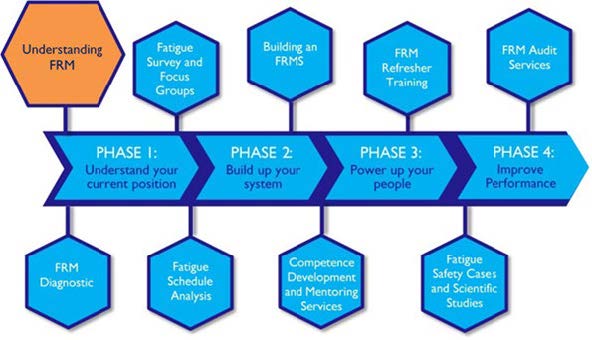TS120 | 2 days
Effectively managing fatigue risk remains a challenge for many operators around the world. The European Aviation Safety Agency (EASA) note that ‘fatigue is repeatedly identified as one of the most serious challenges within the industry’(EPAS 2023-2025 volume 1). So the question for Operators is, having made initial progress and implemented fatigue risk management, what’s next to make sure we are managing fatigue effectively?
Since the implementation of EASA ORO.FTL, Air Operators have been operating to the EASA flight and duty time limitations and are required to manage fatigue risk within the management system. Managers, the Fatigue Safety Action Group (FSAG), rostering and crew have received initial and recurrent training in how to meet their specific fatigue risk management responsibilities, and most operators have a crew fatigue reporting system in place.
This course will enable you to evaluate the maturity and effectiveness of fatigue risk management in your Air Operation. Practical guidance is provided on how to make
improvements, including evaluating your FRM processes, engaging colleagues, updating
knowledge on recent developments in fatigue science and ensuring that your fatigue risk management is effective and appropriate.
Delivered exclusively for your company
How will this course benefit me?
Delivered by our fatigue management experts, this course will provide guidance on how to take Fatigue Risk Management (FRM) in your operation to the next level.
From this course, you will be able to:
Key areas of focus
Is this course right for me?
This course is suitable for the following roles:
Prerequisites:
Some experience of fatigue risk management is preferred, including knowledge of the regulations and the basics of sleep and fatigue.
Course details
This course is a balanced mix of group discussions and tasks, which will include use of example fatigue safety cases as well as analysis of examples of fatigue reports.
Course format: This course is a balanced mix of group discussions and tasks, which will include using validated tools to assess your own fatigue risk management processes.
Course level: Practitioner Level Training (P) is suitable for those who have worked in the subject for some time, are familiar with core terminologies and concepts and are looking to develop or update their level of knowledge and practical understanding.
Assessment process: No formal assessment. Formative feedback is provided by the facilitator.
Course size: 16 persons maximum at our Aviation Safety Academy or on-site at your facility.
Part of our Fatigue Risk Management Portfolio
Part of our suite of Fatigue Risk Management Training and Consultancy Services, this training forms part of an organisation’s journey from understanding FRM to learning how to apply the principles for performance improvement.

This course has been specifically designed for people experienced in fatigue risk management, who are looking to evaluate and improve the effectiveness of their program. By working through real examples of the challenges other operators have
overcome, and by workshopping the hurdles you are facing, you can develop a practical action plan for how to take fatigue risk management to the next level in your operation. Additionally, EASA ORO.FTL requires that all those involved in fatigue risk management receive initial and recurrent training.
The majority of operators manage fatigue within an SMS, or ‘appropriate FRM’, and without seeking to work outside of the limits. The course is relevant to all operators.
Improving fatigue risk management can seem daunting, particularly for smaller operators. However, one of the key tenets of fatigue risk management is that it should be proportional to the size, nature of operations, and the level of risk exposure. Thus, fatigue risk management has comparable benefits for large and small operators. This course focuses on your risks and challenges and meets you where you are at.
EASA’s first study into the effectiveness of flight time limitations found that the fatigue associated with night duties was not adequately controlled by the original ORO.FTL regulations. As a result, EASA published ED Decision 2023/023/R, updating the regulations and requiring operators to apply ‘appropriate FRM’ to all night duties, not simply long night duties. Appropriate FRM, and managing fatigue around night duties and disruptive schedules are discussed in detail throughout the course.
Duration: 3 days
Reference: TS02
Course details
Duration: 3 days
Reference: TS90
Course details
Duration: 3 days
Reference: TS101
Course details
Duration: 1 days
Reference: TS01
Course details
Duration: 1.5 days
Reference: TS132
Course details